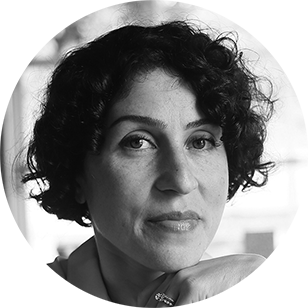ICE's long campaign of silence
Migrants deserve the right to protest their own mistreatment

A free daily email with the biggest news stories of the day – and the best features from TheWeek.com
You are now subscribed
Your newsletter sign-up was successful
In early September, immigrants held at the Stewart Detention Center in Georgia took action to protest inhumane conditions at the facility. About 70 men, predominantly from Cuba and Nicaragua, stayed in the recreation yard all night with shirts and bed sheets proclaiming their handwritten message "libertad" along with signs that said "help." The next day, about 20 men inside the facility, one of the largest immigration detention centers in the country owned by the private prison company CoreCivic (formerly the Corrections Corporation of America), also began protesting in support of the men outside.
The facility's response to these peaceful protests, according to those who were there, was to brutally attack the migrants with pepper spray and rubber bullets. Subsequently, the entire facility was placed on lockdown for three days and anyone alleged to have participated in the protests was put in solitary confinement before being transferred or deported. While in solitary, one man fighting back tears told Project South, the organization we both work for: "We are afraid. I am not OK... they are trying to keep us quiet." ICE has denied they used rubber bullets in response to the protest.
The right to protest is a human right that must be protected for everyone, especially those fighting unjust and cruel systems of oppression. Yet detained immigrants continue to face abusive treatment and brutal repression when they stand up for their rights. As we mark International Migrants Day this week, we must reaffirm our commitment to shut down these detention centers, along with the unjust legal systems they serve, and to support immigrants' fight for basic human rights and dignity.
The Week
Escape your echo chamber. Get the facts behind the news, plus analysis from multiple perspectives.

Sign up for The Week's Free Newsletters
From our morning news briefing to a weekly Good News Newsletter, get the best of The Week delivered directly to your inbox.
From our morning news briefing to a weekly Good News Newsletter, get the best of The Week delivered directly to your inbox.
The men protesting at Stewart were not only objecting to the inhumane conditions at the facility but also the unjust immigration system and immigration judges who continue to deny asylum at abnormally high rates, regularly deny parole and bond, or set bond at prohibitively high amounts. In a letter to Project South, one man from Cuba wrote that he was denied parole and asylum, "because in this center no one wins; I have my evidence and it doesn't matter to them... I have so many things to recount to you that I could never finish; you cannot imagine the wrongs that they do to us here and only for being immigrant."
Another letter, dated November 6, 2019 and signed by 27 immigrants detained at Stewart, stated: "For them [ICE], we are not human beings nor immigrants. For them, we are a business. ICE operates slowly in their process and that allows the owners of the detention center to keep us here for as long as they want. It does not matter to them who is sick or who is suffering from various causes; they are only interested in knowing how many immigrants they have in order to know how much money to charge."
The response to the September protest was draconian. And this is far from the first time Stewart has used excessive force and retaliatory practices against immigrants. The government and CoreCivic have a track record of ignoring immigrants' concerns and then using a variety of malicious tactics including violence when those immigrants attempt to stand up for their rights.
As early as 2006, when Stewart first started operating as an ICE facility, immigrants reportedly faced inhumane conditions such as forced labor, a lack of medical and mental health care, inedible food, verbal abuse, and neglect by officers. They essentially shared the same concerns as immigrants at Stewart today. One formerly detained immigrant, Sav, recalled to us that in 2006 immigrants had to protest to get basic necessities such as recreation time. Prior to the protests, Stewart consistently subjected everyone in the detention center to facility-wide lockdowns for hours on end.
A free daily email with the biggest news stories of the day – and the best features from TheWeek.com
One evening in 2006 or 2007, according to Sav, immigrants inside three units at Stewart protested after multiple officers ignored their requests to get fresh air over the course of several hours. Afterwards, correctional officers wearing riot gear reportedly beat immigrants, shot at them with rubber bullets, sprayed them with pepper spray, and punished them with solitary confinement. Sav remembers laying on the floor with pepper spray in his eyes when he was handcuffed and taken directly to solitary without having a chance to rinse his eyes or receive any type of medical care. He was later transferred to the Etowah County Detention Center and recalls that the officials "targeted people who were standing up for their rights. They were separating everyone who used their voice. Anyone who dissented."
In 2014, Stewart reportedly used lockdown and pepper spray on detained immigrants participating in a hunger strike to protest maggots in their food, lack of medical care, due process violations, and other human rights abuses.
Similarly, in 2015, officials at Stewart reportedly "brutally suppress[ed] hunger strikes, work stoppages and other forms of resistance" by attacking "immigrants with rubber bullets and pepper spray. At least one individual required serious medical attention due to the harsh response and excessive use of force." Immigrants were protesting the meager quality of food at Stewart along with the "long periods of time people are forced to stay in detention without being able to appear before a judge."
In 2017, ICE fought to obtain a court order to force-feed an immigrant on hunger strike.
In 2018, several immigrants reported that officers retaliated against them by sending them to solitary confinement for threatening to not participate in Stewart's forced labor program or for filing a grievance or complaint. Two immigrants were sent to solitary confinement after they filed a grievance in 2018 for not getting paid for the work they did as part of the forced labor program. In another instance, one detained immigrant was put in segregation for about two months after "he filed a grievance against an officer for forcing him to work while he was sick."
From its inception, Stewart has destroyed the lives of an untold number of migrants. Four men have died at the facility in the last few years alone, two by suicide.
Yet Stewart continues to use these same intimidation tactics. The November letter signed by 27 detained immigrants stated: "Their intent is to silence us and isolate us from each other, creating panic and intimidation inside the detention center. They know the injustice that they are committing. The best way for them to cover up the abuse is to intimidate the immigrant."
For years, advocates have called on authorities to investigate and shut down Stewart. Earlier this year, Project South joined 100 other groups to submit a second letter to the Georgia Congressional delegation urging our representatives to take action in the wake of the most recent death at Stewart, that of Pedro Arriago Santoya this past July.
Now, on International Migrants Day, we continue to urge Congress to respect the dignity of migrants by investigating and closing down the Stewart Detention Center, and we urge people everywhere to speak up in solidarity with those whose voices are being silenced.
Priyanka Bhatt is Staff Attorney at Project South. Azadeh Shahshahani is Legal & Advocacy Director at Project South and a past president of the National Lawyers Guild; she tweets @ashahshahani.
Azadeh is the legal and advocacy director at Project South. She has worked for a number of years in the U.S. South to protect and defend immigrants and Muslim, Middle Eastern, and South Asian communities. She previously served as president of the National Lawyers Guild and as National Security/Immigrants’ Rights Project Director with the ACLU of Georgia. She is the author or editor of several human rights reports, including a 2017 report titled Imprisoned Justice: Inside Two Georgia Immigrant Detention Centers, as well as law review articles and book chapters focused on racial profiling, immigrants’ rights, and surveillance of Muslim-Americans. Her writings have appeared in The Guardian, The Nation, MSNBC, USA Today, Aljazeera, and HuffPost, among others.
-
 5 calamitous cartoons about the Washington Post layoffs
5 calamitous cartoons about the Washington Post layoffsCartoons Artists take on a new chapter in journalism, democracy in darkness, and more
-
 Political cartoons for February 14
Political cartoons for February 14Cartoons Saturday's political cartoons include a Valentine's grift, Hillary on the hook, and more
-
 Tourangelle-style pork with prunes recipe
Tourangelle-style pork with prunes recipeThe Week Recommends This traditional, rustic dish is a French classic
-
 Epstein files topple law CEO, roil UK government
Epstein files topple law CEO, roil UK governmentSpeed Read Peter Mandelson, Britain’s former ambassador to the US, is caught up in the scandal
-
 Iran and US prepare to meet after skirmishes
Iran and US prepare to meet after skirmishesSpeed Read The incident comes amid heightened tensions in the Middle East
-
 Israel retrieves final hostage’s body from Gaza
Israel retrieves final hostage’s body from GazaSpeed Read The 24-year-old police officer was killed during the initial Hamas attack
-
 China’s Xi targets top general in growing purge
China’s Xi targets top general in growing purgeSpeed Read Zhang Youxia is being investigated over ‘grave violations’ of the law
-
 Panama and Canada are negotiating over a crucial copper mine
Panama and Canada are negotiating over a crucial copper mineIn the Spotlight Panama is set to make a final decision on the mine this summer
-
 Why Greenland’s natural resources are nearly impossible to mine
Why Greenland’s natural resources are nearly impossible to mineThe Explainer The country’s natural landscape makes the task extremely difficult
-
 Iran cuts internet as protests escalate
Iran cuts internet as protests escalateSpeed Reada Government buildings across the country have been set on fire
-
 US nabs ‘shadow’ tanker claimed by Russia
US nabs ‘shadow’ tanker claimed by RussiaSpeed Read The ship was one of two vessels seized by the US military


